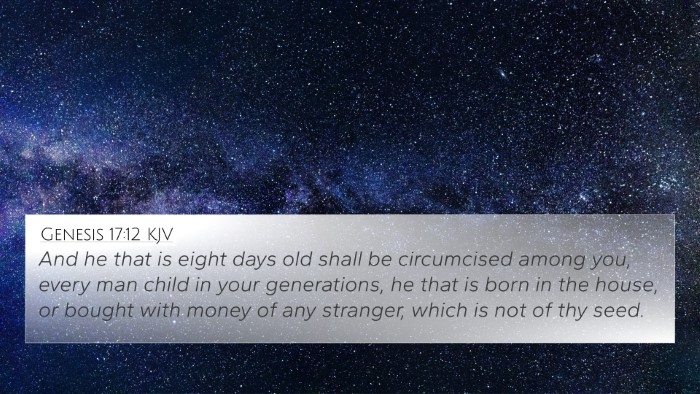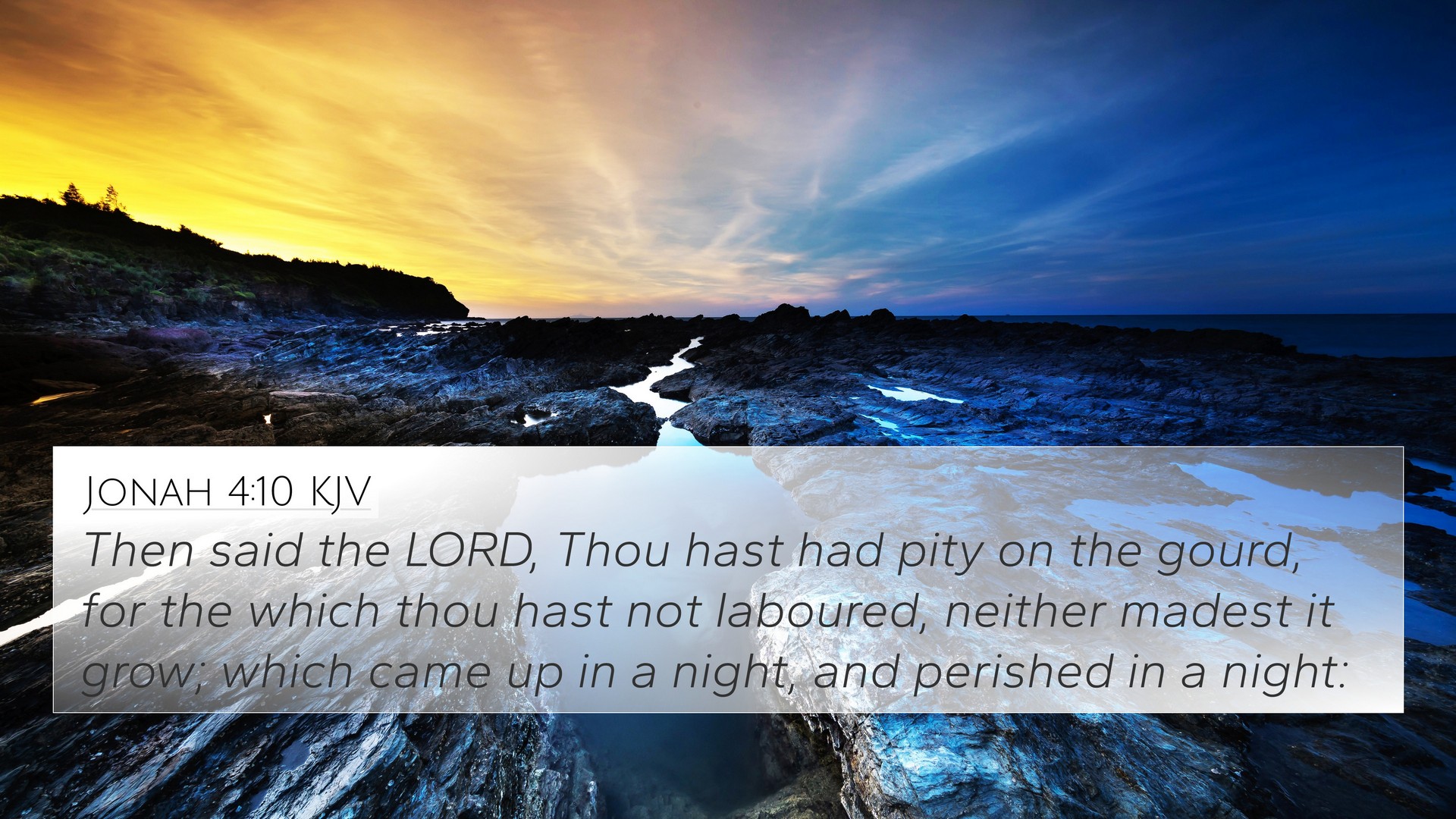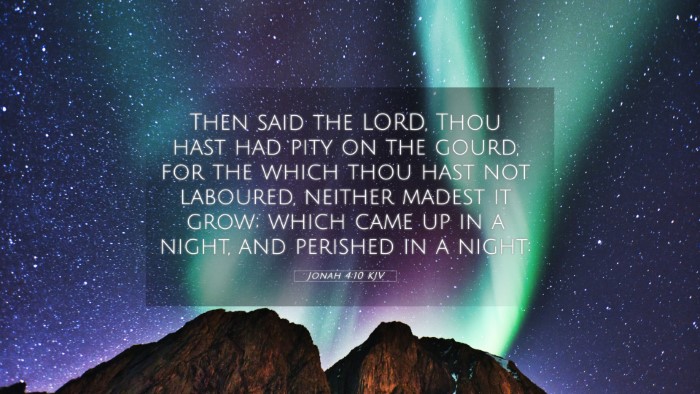Old Testament
Genesis Exodus Leviticus Numbers Deuteronomy Joshua Judges Ruth 1 Samuel 2 Samuel 1 Kings 2 Kings 1 Chronicles 2 Chronicles Ezra Nehemiah Esther Job Psalms Proverbs Ecclesiastes Song of Solomon Isaiah Jeremiah Lamentations Ezekiel Daniel Hosea Joel Amos Obadiah Jonah Micah Nahum Habakkuk Zephaniah Haggai Zechariah MalachiJonah 4:10 Similar Verses
Jonah 4:10 Cross References
Then said the LORD, Thou hast had pity on the gourd, for the which thou hast not laboured, neither madest it grow; which came up in a night, and perished in a night:
Uncover the Rich Themes and Topics of This Bible Verse
Listed below are the Bible themes associated with Jonah 4:10. We invite you to explore each theme to gain deeper insights into the Scriptures.
Jonah 4:10 Cross Reference Verses
This section features a detailed cross-reference designed to enrich your understanding of the Scriptures. Below, you will find carefully selected verses that echo the themes and teachings related to Jonah 4:10 KJV. Click on any image to explore detailed analyses of related Bible verses and uncover deeper theological insights.

1 Samuel 20:31 (KJV) »
For as long as the son of Jesse liveth upon the ground, thou shalt not be established, nor thy kingdom. Wherefore now send and fetch him unto me, for he shall surely die.

Genesis 17:12 (KJV) »
And he that is eight days old shall be circumcised among you, every man child in your generations, he that is born in the house, or bought with money of any stranger, which is not of thy seed.
Jonah 4:10 Verse Analysis and Similar Verses
Understanding Jonah 4:10
Jonah 4:10: "Then said the LORD, Thou hast had pity on the gourd, for the which thou hast not laboured, neither madest it grow; which came up in a night, and perished in a night."
This verse reflects a critical moment in the narrative of Jonah, illustrating profound themes of compassion, divine sovereignty, and the nature of God’s mercy. Here, God uses the example of a gourd that provided Jonah with shade to reveal the prophet's misplaced priorities and emotional attachments.
Commentary Insights
Matthew Henry: Henry highlights that the gourd signifies transient comforts and how easily people can become attached to them. He points out that Jonah grieved over a plant that he did not cultivate, indicating the absurdity of his discontentment regarding God's mercy towards Nineveh. This illustrates a contrast between Jonah's "compassion" for a mere plant and God's compassion for a great city filled with people and animals.
Albert Barnes: Barnes underlines the idea that God is concerned for more than just the material or superficial aspects of life. By emphasizing the gourd's ephemeral existence, Barnes draws attention to how Jonah's focus on a temporary comfort was misguided. This serves to teach Jonah—and the reader—about the depth and breadth of divine compassion, extending beyond human understanding.
Adam Clarke: Clarke explores the implications of Jonah's emotional state, noting that his sorrow for the gourd is indicative of human tendencies to prioritize fleeting comforts over eternal life. He argues that this divine lesson reveals how God’s mercy is not just to be understood in terms of personal grievances but also as part of the larger narrative of human redemption and God's overarching plan.
Related Themes
The themes presented in Jonah 4:10 connect deeply to several biblical principles, including:
- Divine Compassion: God's mercy towards humanity contrasts sharply with human pettiness.
- Transience of Material Comforts: The physical world is temporary while spiritual concerns are eternal.
- Priorities and Values: The need for realignment of personal concerns in light of God’s greater plans.
Cross-Referencing Related Bible Verses
When analyzing Jonah 4:10, several other Bible verses provide additional insights and parallels:
- Matthew 5:45: Demonstrates God's impartial benevolence, as He makes the sun rise and rain fall on both the just and unjust.
- Luke 15:20-24: The parable of the lost son showcases God’s compassion toward sinners.
- Psalm 103:13: God’s mercy is compared to that of a father showing compassion to his children.
- 2 Peter 3:9: Highlights that God desires that none should perish but all should come to repentance.
- Exodus 34:6-7: Reveals God's nature as compassionate and gracious, slow to anger, and abounding in love and faithfulness.
- Matthew 9:36: Jesus feels compassion for people, describing them as sheep without a shepherd, paralleling God’s concern for Nineveh.
- Romans 9:15-16: Paul discusses God's mercy in choosing whom to show mercy, reinforcing the concept of God’s sovereign choice in bestowing compassion.
Thematic Connections and Comparative Analysis
While Jonah laments over a gourd—something of little value in the grand scheme—God draws his attention to the people of Nineveh who are spiritually impoverished yet worth redeeming. This serves not only to provide a critique of Jonah's attitude but also invites readers to engage in continuous self-reflection regarding their own priorities and values within their walk of faith.
A Call for Reflection
As we consider Jonah 4:10, we invite readers to reflect on their reactions to God's mercy. In what ways do we find ourselves valuing fleeting comforts over eternal souls? As Christians, how do we embody the mercy of God in our lives? The cross-references, thematic links, and comparative analyses collectively urge us to re-examine the nature of our compassion and understand it through the lens of divine love and mercy.
Tools for Further Study
For those looking to explore these connections and themes more deeply, various tools for Bible cross-referencing are available:
- Bible Concordance: A valuable resource for locating specific terms and their contextual meanings.
- Bible Cross-Reference Guide: Provides links between verses that share similar themes and messages.
- Cross-Reference Bible Study: Methods to engage with scripture in relation to other texts for a deeper understanding.
Conclusion
Through an analysis of Jonah 4:10 and its connections to other scriptures, we gain insight into the heart of God, reminding us of the importance of prioritizing compassion, mercy, and the value of human souls over transient comforts. The study of scripture in light of one another opens pathways to deeper understanding, spiritual growth, and the embodiment of God’s love in our own lives.


